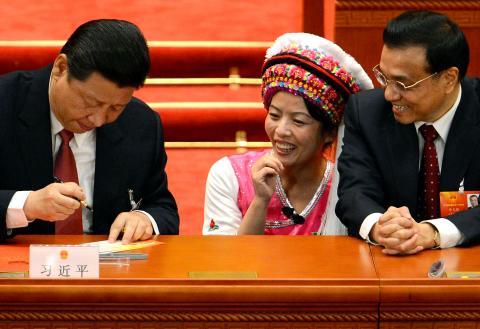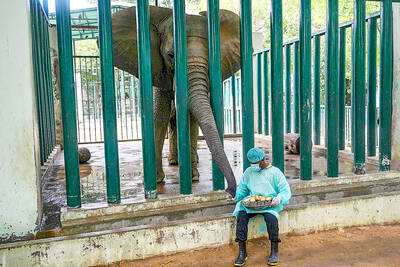Wearing an embroidered cap signaling her Uighur ethnicity, Rehangul Yimir’s presence in the Great Hall of the People symbolizes Beijing’s efforts to gloss over simmering frictions among its disparate peoples.
According to official figures Xinjiang is 46 percent Uighur — who speak a Turkic language and are mostly Muslim — and 39 percent Han Chinese, after millions moved to the area in recent decades.
Relations between them are often tense and riots rocked Xinjiang, which is twice the size of Turkey and rich in oil and gas, in 2009, when about 200 people died.

Photo: AFP
However, Yimir, who at 24 was the youngest member of Xinjiang’s delegation to the National People’s Congress (NPC), is proud to uphold Beijing’s banner of ethnic harmony, and expresses a keen interest in policy for the country’s legions of migrant workers.
“I’m satisfied” with the central government’s efforts on the issue, she told reporters, praising what she called measures to promote opportunities for her people to work in other parts of China.
The Chinese Communist Party line at the NPC, which is due to end tomorrow, is to stress warmth between China’s 55 ethnic minorities and the Han majority, who comprise 91 percent of the population of 1.35 billion.
However, far beyond the security bubble around the rubber-stamp legislature, the reality on the ground can be very different.
More than 100 ethnic Tibetans have set themselves on fire, many fatally, since 2009 to protest state policies and express a desire for the return of the exiled spiritual leader the Dalai Lama.
However, Losang Jamcan, chairman of the Tibet regional government, stuck resolutely to the official line.
“We will absolutely resist the Dalai clique to maintain harmony and stability in Tibet and realize sustainable development,” he said at the NPC. “We must cherish ethnic unity, as well as harmony and stability, as we do our own eyes.”
The day Yimir spoke, several knife-wielding attackers killed four people and wounded eight others 2,400km away in the Xinjiang city of Korla, according to officials, amid reports of ethnic clashes and a security crackdown. Authorities later blamed a family dispute.
Such discord is rarely raised at delegations’ NPC meetings, where “work reports” are read extolling progress.
“Xinjiang natives are carefree,” read an English-language brochure at the provincial gathering.
China says Tibetans enjoy religious freedom and rising living standards as a result of huge investment by Beijing.
Xinjiang — which straddles the Silk Road and has a strong trading history — has a growing urban middle class.
A number of minority figures who have embraced the “status quo” have achieved national prominence, including Fu Ying (傅瑩), an ethnic Mongol vice foreign minister and an NPC spokeswoman.
“Throughout the centuries, China has been a multiethnic society connected by a commitment to unity, prosperity and harmony,” she wrote in the Guardian in 2009. “Unity is deep in the blood.”
However, those who question the state narrative face trouble.
Rebiya Kadeer, once a wealthy businesswoman and NPC delegate, fell out with the government and was jailed, before being released in 2005 and moving to the US, where she now leads the World Uyghur Congress (WUC).
Beijing-backed Uighur delegates to the NPC can gain promotions, government positions and business opportunities for themselves and their families, she said.
“Most of these delegates are the people who think about their own personal interests,” she told reporters in an e-mail relayed by the WUC. “They don’t care about their people and their suffering.”
Several hope to do good, she added, but find the “bitter reality” is that they cannot speak out in Beijing. Giving them the opportunity to do so, she added, “could have eased the tensions and helped to foster integration in China.”
Reza Hasmath, lecturer in Chinese politics at Oxford University, said there was strong pressure for minority ethnic groups to conform with the authorities.
“This is mainly due to the fact that minorities who cast their lot with the establishment can access Han social networks, which provides greater opportunities to higher status, and better paying jobs,” he said by e-mail.
However, Beijing’s policies can prove counterproductive, Hasmath said. Chinese authorities have slowly phased out the use of the Uighur language in most Xinjiang schools and universities, he noted, leaving Mandarin Chinese the main mode of instruction.
While the intent was to promote amalgamation, “at the same time, it creates greater ethnic tension,” he said.

NO EXCUSES: Marcos said his administration was acting on voters’ demands, but an academic said the move was emotionally motivated after a poor midterm showing Philippine President Ferdinand Marcos Jr yesterday sought the resignation of all his Cabinet secretaries, in a move seen as an attempt to reset the political agenda and assert his authority over the second half of his single six-year term. The order came after the president’s allies failed to win a majority of Senate seats contested in the 12 polls on Monday last week, leaving Marcos facing a divided political and legislative landscape that could thwart his attempts to have an ally succeed him in 2028. “He’s talking to the people, trying to salvage whatever political capital he has left. I think it’s

Polish presidential candidates offered different visions of Poland and its relations with Ukraine in a televised debate ahead of next week’s run-off, which remains on a knife-edge. During a head-to-head debate lasting two hours, centrist Warsaw Mayor Rafal Trzaskowski, from Polish Prime Minister Donald Tusk’s governing pro-European coalition, faced the Eurosceptic historian Karol Nawrocki, backed by the right-wing populist Law and Justice party (PiS). The two candidates, who qualified for the second round after coming in the top two places in the first vote on Sunday last week, clashed over Poland’s relations with Ukraine, EU policy and the track records of their

UNSCHEDULED VISIT: ‘It’s a very bulky new neighbor, but it will soon go away,’ said Johan Helberg of the 135m container ship that run aground near his house A man in Norway awoke early on Thursday to discover a huge container ship had run aground a stone’s throw from his fjord-side house — and he had slept through the commotion. For an as-yet unknown reason, the 135m NCL Salten sailed up onto shore just meters from Johan Helberg’s house in a fjord near Trondheim in central Norway. Helberg only discovered the unexpected visitor when a panicked neighbor who had rung his doorbell repeatedly to no avail gave up and called him on the phone. “The doorbell rang at a time of day when I don’t like to open,” Helberg told television

A team of doctors and vets in Pakistan has developed a novel treatment for a pair of elephants with tuberculosis (TB) that involves feeding them at least 400 pills a day. The jumbo effort at the Karachi Safari Park involves administering the tablets — the same as those used to treat TB in humans — hidden inside food ranging from apples and bananas, to Pakistani sweets. The amount of medication is adjusted to account for the weight of the 4,000kg elephants. However, it has taken Madhubala and Malika several weeks to settle into the treatment after spitting out the first few doses they